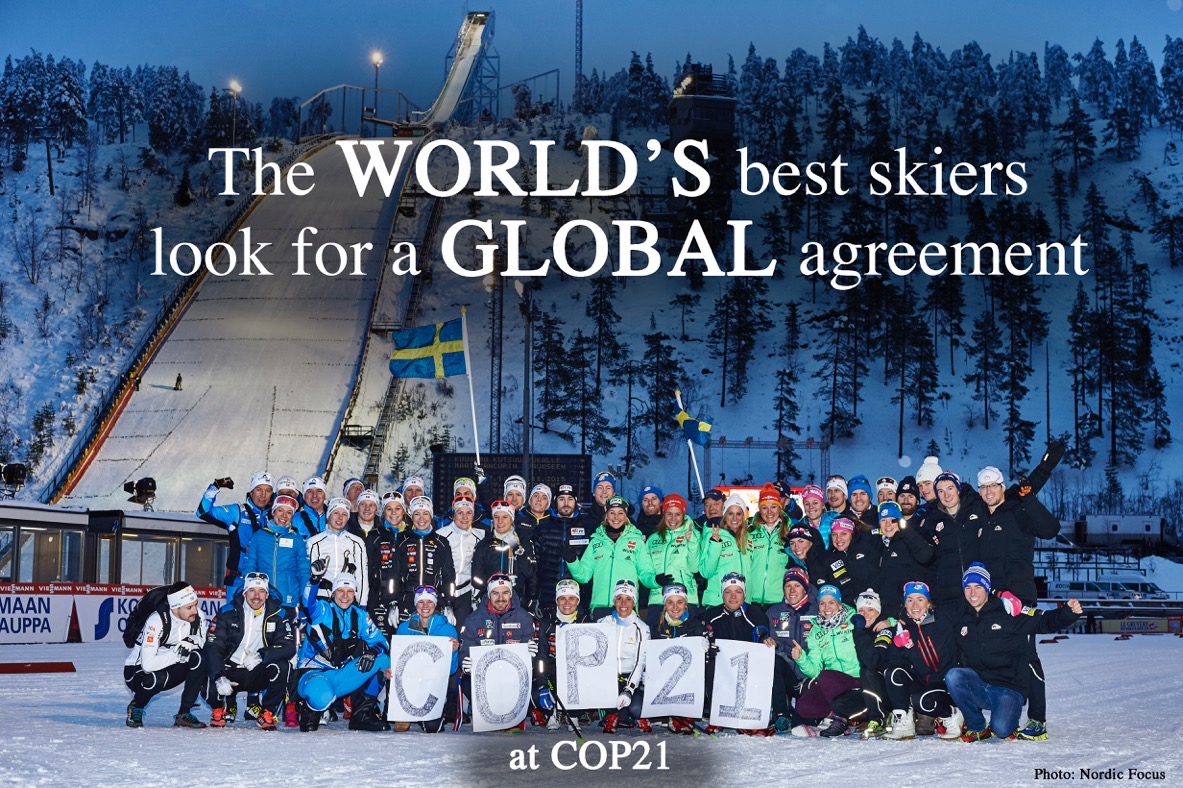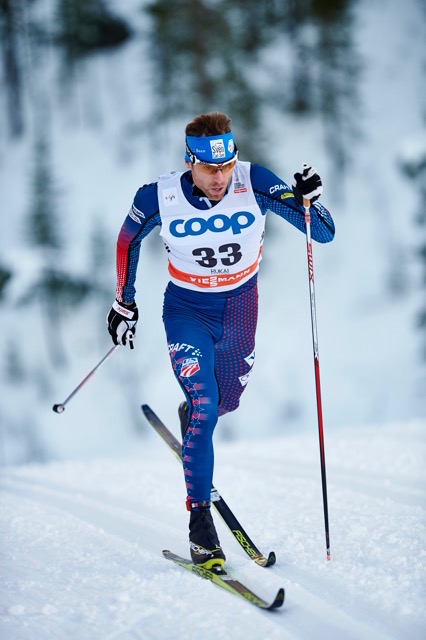
Last time the United Nations held a climate change summit, U.S. cross-country skier Andy Newell traveled to New York City to walk in the People’s Climate March, the biggest climate change protest in history.
But that was summer – when it’s easy to schedule in a rest day and make the drive from Vermont.
This time around, the United Nations is holding talks in Paris and Newell is on the road in Scandinavia as he embarks on a new World Cup competition season.
So two days after placing fourth in the opening race of the year, he gathered international ski stars in a stadium in Kuusamo, Finland, and together they called on international leaders to make progress in Paris.
“I was going to be in Paris with them myself if I could during this week, but it doesn’t work out,” Newell said by phone from Lillehammer, Norway, the next stop on the World Cup circuit. “I felt like it was the least we could do to try to rally some international support through some of these big-name skiers. It shows that no matter what country you’re from, we’re all united in supporting these meetings and hoping that the U.N. can come up with a more substantial agreement than they did the last time around, and hopefully make a legally-binding agreement to hole countries responsible for their energy usage.”
Why is Newell so motivated? Among other reasons, snow sports enthusiasts will have a harder time finding their recreation opportunities in a changing climate. Numerous studies have shown that projected shifts in temperature and precipitation will shrink the area where winter sports are available.
“This is so important to our sport because our sport is changing. Last year we raced on real snow ONCE. That’s all. One race on the whole World Cup wasn’t on man-made stuff. I’d really like to share this awesome sport we do with my grandkids someday, and I hope that will be possible.”
—Jessie Diggins, U.S. Ski Team & Stratton Mountain School SMST2, on her blog
For example, in the Tyrolian Alps of Austria and Italy, ski areas will have to quadruple their snowmaking capacities to guarantee a 100-day season by the middle of the century. Many areas might not be able to afford such investment.

In New Zealand snow depth is likely to be just half of its current level at ski resorts by the end of the century, with the same researchers predicting that in the Australian Alps our grandkids could experience snow just 20% as deep as we see now.
In the French and Spanish Pyrenees, less than half of ski resorts would survive a 2°C warming given their current infrastructure; with more investment in snowmaking that percentage would rise. But with more warming, current snowmaking technology would no longer be able to produce snow, meaning that even the best-prepared resorts might go under.
And most analyses of snowpack for the ski industry are based on alpine resorts, which are often at higher elevations than cross-country ski areas. In other words, cross-country skiing likely faces an even faster loss of trails.
Besides teammates from the U.S. – Liz Stephen and Simi Hamilton helped him organize the event – Newell was joined by Charlotte Kalla and some Swedish teammates, Eirik Brandsdal and some Norwegian teammates, and athletes from Germany and Finland.
While the trio of Americans were the galvanizing force in gathering the group, Newell said that he didn’t have to push hard.
“From talking with Charlotte [Kalla] and some of the Norwegians and Scandinavians in general, they are all very progressive when it comes to energy and being environmentally conscious,” he said. “If anything I’d say that the Scandinavians are more advanced than your average American when it comes to the rights and wrongs of energy and leaning towards more sustainable energy. So it was cool to talk with them about it.”
“That’s my general advice the ski community and really to everybody in the U.S.: try to be heard. Try to pester your senators to make sure they are making the decisions. Work on a statewide basis, and then hopefully these are trends that we can spread onto a national scale and onto a global scale to help move away completely from the fossil fuel industry and to more renewable energy.”
—Andy Newell, U.S. Ski Team & Stratton Mountain School SMST2
FIS Cross Country Chairman Vegard Ulvang joined the group as well. Just a week earlier in his introduction to the new season, Ulvang had already touched on the topic of climate.
“In the short term perspective, we have to trust in our snow guns and snow storages,” he said, according to FIS. “But also they need minus degrees which already last season forced us to cancel a lot of races. Within 50 years it is a fact that we will need new technology that can produce snow in plus degrees in a sustainable way, if it should be possible to ski around many ski resorts and cities where most people live today.”
In that talk, Ulvang noted that the World Cup and the Paris climate negotiations were beginning at the same time.
If only the climate talks could be successful, he urged.
“We can just hope that there will be taken new small steps in the global goal of cutting our common CO2 emissions that is so necessary for our future winters,” he said. “But we do also, all of us, have a personal responsibility to do whatever we can to save our future winters, both lifestyle wise as well as by choosing and branding the necessary new and sustainable technology.”
Newell was pleased that FIS leaders were thinking strategically about climate change.
“I wasn’t surprised, because they are all smart guys,” he said. “And FIS, whether it’s on their agenda or not, they are directly affected by climate change. They want to do everything they can to raise awareness and influence change.”
But he emphasized that although Ulvang agreed with him, the idea for the rally came from the athletes.
“It wasn’t organized by FIS, it was organized by the athletes ourselves,” he explained. “That makes it more genuine, I think. It’s not like FIS was like, okay guys, you need to be at the stadium at a certain time and say x and y to the media. It was much more from the athletes in a personal way.”
Newell is hoping that the rally will get picked up by news organizations in Scandinavia, carried by the names of Kalla, Brandsdal, and other stars.
Nordic countries seem receptive to the message, he said.
“Finland is pretty cool – the day I arrived in Finland I actually did an interview with YLE, which is the national broadcasting network, and they were doing a special about the Paris climate talks,” Newell explained. “For sure they are tuning into what’s happening in Paris during this week and are very committed to making some big changes.”
And while he hopes that more people will urge their leaders to make meaningful, legally-binding agreements in Paris, Newell also knows that change starts at home.
“I would say to ski fans to try to continue to reduce our usage,” he said. “But my big thing is not just reduction on a personal scale, but really getting on the backs of our politicians and our state representatives to try to make a smooth transition to more renewable energy. Really, we need to get on the backs of the guys and women in the U.S. who make these decisions and put some pressure on them.”
Chelsea Little
Chelsea Little is FasterSkier's Editor-At-Large. A former racer at Ford Sayre, Dartmouth College and the Craftsbury Green Racing Project, she is a PhD candidate in aquatic ecology in the @Altermatt_lab at Eawag, the Swiss Federal Institute of Aquatic Science and Technology in Zurich, Switzerland. You can follow her on twitter @ChelskiLittle.



